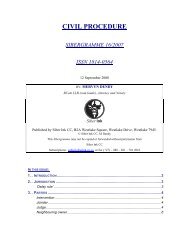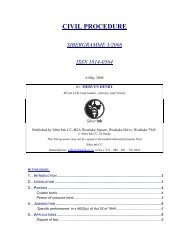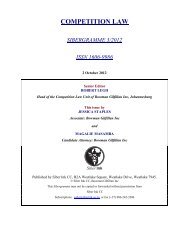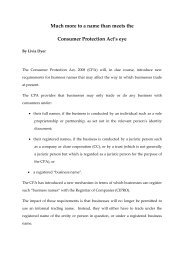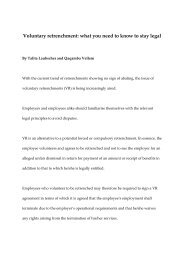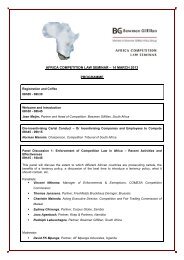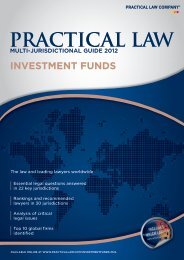A The Mergers - Bowman Gilfillan Attorneys
A The Mergers - Bowman Gilfillan Attorneys
A The Mergers - Bowman Gilfillan Attorneys
You also want an ePaper? Increase the reach of your titles
YUMPU automatically turns print PDFs into web optimized ePapers that Google loves.
South Africacompany of any debt owing by a connected party of the company to a third party andwhen the company ceases to be a South African tax resident.i Interest exemption for non residents – changesCurrently, interest received by or accruing to non-residents is exempt from South Africanincome tax, provided that the non-resident does not carry on business in South Africa atany time during the course of the tax year, through a permanent establishment. If a nonresident receives interest income that does not qualify for the income tax exemption, thetax payable does not take the form of a withholding tax and the recipient of the interestwill have to account for the tax.However, the tax exemption that currently applies to interest earned by nonresidentsis in the process of being amended. <strong>The</strong> proposed amendments will apply inrespect of any interest that accrues, is received, becomes payable or which is deemed tohave accrued on or after 1 March 2011. <strong>The</strong> general effect of the proposed amendmentwill be that all interest received by non-residents will now be taxed, although interest willbe exempt from South African income tax if the interest is earned in respect of certaindomestic investments such as government bonds, bonds listed on the JSE, collectiveinvestment schemes, bank deposits (this exemption for bank deposits does not includeback-to-back loan agreements designed to circumvent the general rule of taxationand the exemption will not apply if the bank acts as an intermediary to facilitate theborrowing of funds by a domestic company from a foreign lender), international tradefinance, dealer and brokerage accounts, and any interest received or accrued to a nonresidentfrom another non-resident.ii Thin capitalisation changes<strong>The</strong> South African tax legislation contains provisions that limit the tax deduction ofinterest paid on debt arrangements between certain related parties. <strong>The</strong> rules specificallyapply where a non-resident grants financial assistance to a related South African residentor any other South African resident company in which the non-resident has a director indirect interest entitling it to participate in at least 25 per cent of the dividends,profits or capital of the company or to exercise at least 25 per cent of the votes in theSouth African company. In order for the provisions to apply to a specific transaction,the South African Revenue Service must be of the opinion that, having regard to thecircumstances, the total value of the financial assistance is excessive in relation to thefixed capital of the recipient of the financial assistance.<strong>The</strong>se thin capitalisation rules in are in the process of being amended and theamendments are intended to come into operation when the New Companies Act takeseffect in late 2010 or early 2011. <strong>The</strong> amended rules will apply to financial assistancegranted by non-residents to South African residents, and to financial assistance grantedby non-residents to other non-residents that have permanent establishments in SouthAfrica. <strong>The</strong> effect of the amendments is that the South African branches of foreigncompanies will be treated in the same manner as the subsidiaries of foreign companies.502





